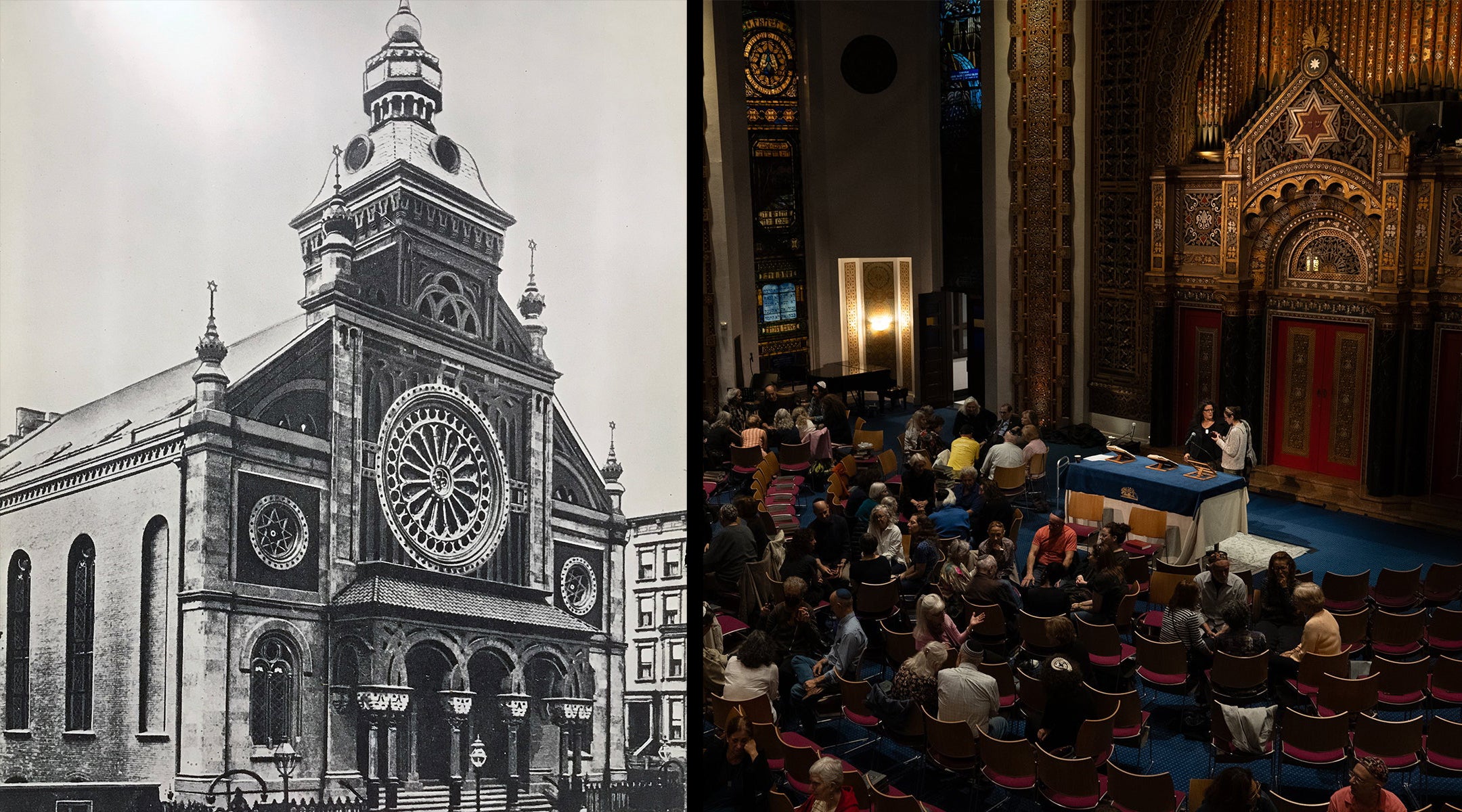B’nai Jeshurun, the Upper West Side’s renowned non-denominational congregation, is celebrating its 200th anniversary this year.
The congregation — which was the second synagogue founded in the city — has been in the same building at 257 West 88th Street since 1918.
To celebrate the bicentennial of its founding, B’nai Jeshurun is organizing a series of events throughout the year — including a live concert in the synagogue’s sanctuary on Thursday night titled, “Echoes of a Journey: 200 Years of Jewish Music at BJ.”
Led by B’nai Jeshurun’s music director, Dan Nadel, the concert is billed as an “exploration of 200 years of Jewish music at BJ — honoring the past, embracing the present, and looking toward the future.”
“I noticed before I worked [here]: it’s kind of famous, people always talk about the music when they talk about BJ,” said Nadel, who’s been the shul’s music director since 2017.
In an telephone interview with the New York Jewish Week, Nadel said he’s been planning Thursday’s concert, which is part of the Micki Levin Concert Series, for the past eight months or so. In organizing the event, Nadel said one of his top priorities has been honoring and amplifying the synagogue’s “very global approach to music.”
“Any typical Shabbat service, not to mention High Holidays, might include melodies from Eastern Europe, but also from Morocco, Iraq, Yemen, perhaps from Hasidic communities in Ukraine,” Nadel said. “Retaining an identity within the merging of all these different inspirations — this is what I think makes BJ unique.”
Nadel said this musical approach was “inspired and pushed” by Rabbi Roly Matalon, who “was always very interested in the music of the global Jewish diaspora.”
Matalon, who was born in Buenos Aires, has been B’nai Jeshurun’s head rabbi since 1993 after initially joining as a rabbi in 1986. In a press release about the event, Matalon said the concert “reflects the path BJ has walked over two centuries — a path rooted in tradition and open to transformation.”
The bicentennial concert is set to feature a vast lineup of singers and musicians, including Grammy Award-winning trumpet player Frank London, who is busy making new music after a battle with blood cancer. The program includes songs that span the gamut from traditional cantorial and Yiddish folk songs to Ladino ballads and Sephardic piyutim, or liturgical poems.
While the concert will honor Matalon’s 40 years of influence on the congregation’s music, Nadel said it will also reach back much farther — around 150 years — into the past.
Nadel and the concert’s “house band,” made up of the musicians who normally play with him for High Holidays and Shabbat services, will play a 150-year-old melody of “Zochreynu L’chaim” (“Remember Us for Life”). The long-lost melody had been preserved through sheet music notated by Jacob Schwartz — B’nai Jeshurun’s cantor starting in 1914 — and was returned to the shul in the last couple years by Schwartz’s grandson. Nadel said they now use a different tune during services, but that both versions will be played on Thursday.
The concert comes midway through a full year of programs celebrating B’nai Jeshurun’s 200th birthday, which was kicked off with a Shabbaton in February. Last weekend, they held a “bicentennial birthday bash” for families.
In addition, in honor of the anniversary, the shul commissioned a mural that would “lift up the community’s central values,” which was completed in May along a central stairwell. They also installed an exhibit exploring the first 100 years of B’nai Jeshurun’s history, covering its inception as a group of some 30 men seeking a space for Ashkenazi-style prayer, its journey through various locations (including its very first building, which was actually a church), and the evolution of its services to incorporate English.
According to Max Orenstein, the shul’s director of communications, the plan is to follow that up in the fall with an exhibit about the shul’s history since 1925.
With 200 years in the books, the congregation has some serious experience celebrating major anniversaries. For example, B’nai Jeshurun’s 100th anniversary dinner was held at the Hotel Astor, according to a New York Times article at the time, which helped them raise over $100,000 (about $1.8 million today) to support “Jewish education among the children of the poor.”
A 1934 Jewish Telegraphic Agency article, titled “When B’nai Jeshurun Was Born Fourteenth Street Was Uptown,” examined just how much had changed between the shul’s founding and its 110th anniversary.
“New York City was still in its swaddling clothes” when the congregation was organized, the article reads. “John Quincy Adams, seventh President of the United States, had recently taken office and De Witt Clinton was the Governor of the State. It was the year of the opening of the Erie Canal.”
Later this year or in 2026, Orenstein said he expects that B’nai Jeshurun’s bicentennial celebrations will culminate in a gala.
Also in 2026: Matalon will retire in June. The plan is for Rabbi Felicia Sol to take his place, becoming the first woman to lead the historic congregation.
“Echoes of a Journey: 200 Years of Jewish Music at BJ” will take place Thursday, June 12 at 7:30 p.m., in the sanctuary at B’nai Jeshurun (257 West 88th St.). Click here for tickets to the in-person event or livestream.
The New York Jewish Week brings you the stories behind the headlines, keeping you connected to Jewish life in New York. Help sustain the reporting you trust by donating today.





